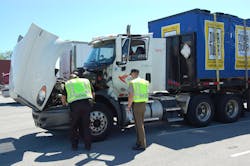Getting due process from the FMCSA
By Mark Andrews, Strasburger & Price LLP
With more than 40 years of practice in Washington, D.C., Mark Andrews, a partner with Strasburger & Price LLP, counsels transportation providers as an advisor and advocate on a wide variety of business, regulatory and judicial matters related to the freight industry. In this guest column, he details how motor carriers can win proper due process from federal and state trucking safety agencies. He can be reached at [email protected].
You just got with bad news: a notice of claim has come in from the Federal Motor Carrier Safety Administration (FMCSA) or state Department of Transportation (DOT) office seeking civil penalties/fines for violations of safety regulations.
Or one of those agencies has announced that your recent safety measurement system (SMS) scores have earned you a “focused assessment” or a full on-site compliance review. The target of the audit may be hours-of-service (HOS) compliance, equipment inspection documents, driver qualification files, drug/alcohol screening results, or all of the above.
Or, worse yet, a recent safety audit resulted in a proposed downgrading of your safety rating to “conditional,” which will cost you business, or to “unsatisfactory,” which will shut you down.
You are convinced that the alleged violations are unrepresentative of your actual safety performance, and you want to fight the charges. You assume that somewhere, somehow, there must be a way to get a fair hearing on the penalties or the rating downgrade from an independent, impartial arbiter who is not acting as judge, jury and prosecutor for FMCSA all at the same time.
Well, maybe … or maybe not. It all depends on the particulars of the charges, on what issues you want to raise, and on the time and resources you are willing to invest in challenging the agency.
The FMCSA’s idea of “administrative due process” is embodied in procedural rules published in Title 49 of the Code of Federal Regulations (CFR).
In particular, Part 386 of the CFR spells out the circumstances under which carriers may obtain informal or formal hearings on charges brought against them. Part 386 has a title that sounds comprehensive (“Rules of Practice for FMCSA Proceedings”).
It sometimes does allow for a formal hearing before an Administrative Law Judge (ALJ), who works for U.S. DOT but is independent of the FMCSA chain of command. Unfortunately, Part 386 provides access to an ALJ only in a limited range of circumstances (more about them later) – and it generally does not apply at all when a motor carrier challenges a downgrade of its safety rating.
When the issue is a safety rating, a very different set of rules in Part 385 of Title 49 of the CFR will apply.
A carrier notified of a proposed “conditional” or “unsatisfactory” rating has two appeal options. Under section 385.15 of Title 49, the carrier may request “administrative review” on grounds that its proposed rating was incorrectly calculated by the auditor under the safety rating formula described in Appendix B to Part 385. This type of request typically will claim that particular violations did not occur or were improperly weighted in the rating formula.
Alternatively, a carrier may request under section 385.17 that its proposed rating be upgraded on the basis of corrective action it has taken after the audit.
A “385.15” filing must be submitted to the chief safety officer at FMCSA headquarters in Washington, D.C., while a “385.17” must be filed with the field administrator of whichever of the agency’s four regional Service Centers covers the carrier’s headquarters state. In neither case, however, do the rules provide access to an ALJ or a similar independent fact finder.
Other FMCSA enforcement actions under Part 385 likewise are decided within the agency’s chain of command, again with no right of recourse to an ALJ. Actions in this category include shutdowns of “new entrants” by field administrators under Subpart D of Part 385, revocation of hazardous materials safety permits by the chief safety officer under Subpart E – unless he or she exercises discretion to refer the matter to an ALJ – and actions by the director of FMCSA’s Bureau of Enforcement under Subpart L against carriers alleged to be reincarnations of previous bad actors.
Even when hearings before an ALJ are theoretically available for civil-penalty cases under Part 386 of Title 49, the pathway to such a hearing is narrow and winding.
Under section 386.16, the carrier receiving the claim must wait until supporting evidence and argument is filed by agency counsel and then must file a reply with the chief safety officer (also known as the assistant administrator) that contains the carrier’s evidence and argument, and must include a specific request for a formal hearing before an ALJ in its reply.
At that point, the assistant administrator has the sole right to “determine whether there exists a dispute of a material fact.” But even if a material disputed fact is determined to exist, the field administrator for the carrier’s state of domicile has a further opportunity to object to a hearing.
Caution: if you only request an informal hearing or just a “hearing,” all you can expect is an informal proceeding before a “hearing officer,” defined as “a neutral agency employee designated by the assistant administrator.”
Informal hearings do not allow a carrier to take depositions or file interrogatories before the hearing, or to file motions challenging procedural rulings by the hearing officer.
Obviously, the procedural barriers described above make access to due process inordinately expensive and time-consuming, especially for the small businesses comprising most of the trucking industry.
Advocates for small carriers have urged U.S. DOT to reduce these barriers as part of its regulatory reform efforts under the new administration, but so far there is no sign that the FMCSA is listening.

